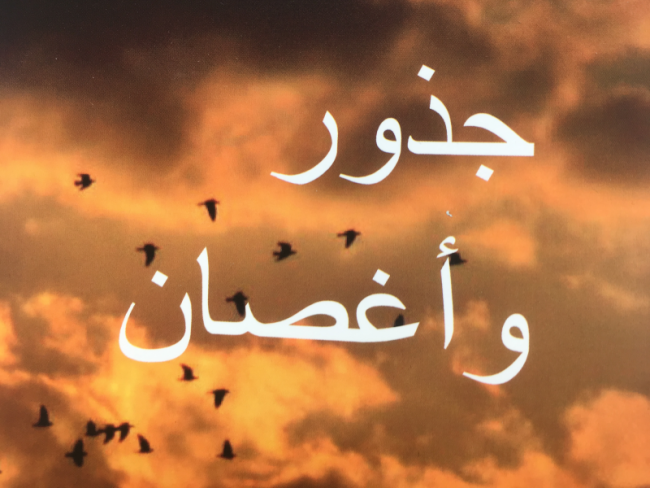Inspiring pupils: multilingual creative writing

Kate Clanchy runs a Poetry Hub at the Oxford Spires Academy, a city school where the majority of pupils have English as an additional language and 32 languages overall are spoken. Last year, Creative Multilingualism's Prismatic Translation strand worked with the Poetry Hub to hold a creative writing workshop in Arabic with award-winning Iraqi poet, Adnan Al-Sayegh. In this blog post, Kate Clanchy talks of the impact of the workshop on pupils at the school, one of whom went on to write a poem that recently won the Betjeman Poetry Prize.
Creative Multilingualism’s Arabic Workshop, funded by the AHRC’s Open World Research Initiative, had lots of consequences in our school.
The first was a strong flow of poems in Arabic. I think several of our Syrian students had been writing quite a lot of poems already, but after the workshop, they wrote dozens and dozens and started bringing them into school. I wanted to channel this enthusiasm, but I don’t have Arabic, so I improvised, often using the help of Shukria Rezaei the Forward Arts Foundation Student. Shukria is Hazara, a Farsi speaker, and was having an extra year in school doing extra A Levels and working as a poetry teaching assistant. Together, we ran three language workshops: we would study a dual language text, such as a poem by Mahmoud Darwish in English and Arabic, and then version it in English and Farsi. We had a Ghazal Club where we had speakers of Farsi, Arabic, Urdu, Pashtu and Bengali round the table. We read ghazals in Persian and Arabic parallel texts and wrote ghazals in English.
There was also the exciting activity of putting together the Arabic Anthology, Roots and Branches, which was also part of the Creative Multilingualism project. The only problem with this (apart from sticking the Arabic script to the correct margin) was that the younger students kept writing new poems to be included – faster than I could hold translation workshops to work on them. I was very grateful indeed to Mohammed-Salah Omri and Julia Bray for their (very) last minute translations and transcriptions, and tried to convey to the students the honour that had been done to their work to have it translated by Oxford professors. I don’t think the students quite took it in, or really believed in the book – until, that is, they saw the finished anthology. Then they were quite overwhelmed: I really cannot overstate the pleasure and pride the children felt in seeing their work published in such a handsome book with such beautiful translations and transcriptions.
But the joy caused another outflow of poems! In the last weeks of school, I was besieged by them, so I organised a series of workshops specifically for the younger EAL students – we filmed some of them, and hope to share the video soon on this site. Now the Syrian students were starting to translate their own work, and even to write straight into English. They wanted to produce another book, at once, and as I couldn’t provide that, I suggested we enter the John Betjeman Competition. This is a wonderful poetry award for 10-13 year olds, with attractive prizes, (train tickets, Poetry Camp), lovely, child-friendly judges, and a perfect theme for my little Syrians: place.
The prize proved the ideal incentive to re-version, translate, and finish work, and incited a vast amount of activity with dictionaries and Google Translate, and many cries of ‘Miss, what is the word for?’. Amineh Abou Kerech, who with her sister Ftoun, was probably the keenest poet of all, had a pile of poems in front of her: translated, in Arabic, in English. I encouraged her to piece them together into a lengthy meditation. The pieces came together very easily even though she had written them over three months – I think because they all had the same inspiration: Mahmoud Darwish’s ‘I am from there’.
We entered seven poems from Oxford Spires Academy into the Betjeman Poetry Prize. I present a couple here to show the standard. These two didn’t even make the last 50. But Amineh’s did, and last week, Amineh went to London with her entire family and actually won the competition. She is overwhelmed and amazed for now. Going on my experience so far, though, this success will cause another flood of poems.
Betjeman Poetry Prize winner, Lament for Syria, read by Amineh Abou Kerech:
Amineh - Lament for Syria with text from movingtarget films on Vimeo.
The Doves of Damascus
I lost my country and everything I had before.
and now
I cannot remember for sure
the soft of the snow in my country,
I cannot remember
the feel of the damp air in summer.
Sometimes I think I remember
the smell of jasmine
as I walked down the street.
And sometimes autumn
with its orange and scarlet leaves
flying in the high Damascus sky.
And I am sure I remember
my grandmother’s roof-garden,
its vines, its sweet red grapes,
The mint she grew in crates for tea.
I remember the birds, the doves
of Damascus. I remember
how they scattered.
I remember
trying to catch them.
Ftoun Abou Kerech (13)
Written in English
A Refusal
They carry you in a black shroud to my door.
This is your plot, Syria, strung with ropes, ready,
These are your deserts, and your mountains circling,
And all the people calling your name.
Syria, you must say to the mourners: my name
Is not on the grave. Though Daddy is martyred
And will not come back through the door,
Though from behind the cloth comes the wail of pain.
The name of Syria is not on the grave.
Mohammed Assaf (12)
(Translated from the Arabic)
Where next?
Raw and impassioned: writing multilingual poetry in an Oxford school
Life in a multilingual community
Thriving in post-Brexit Britain: the importance of languages